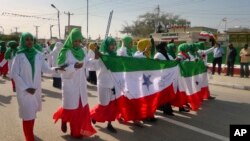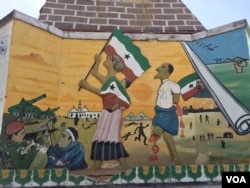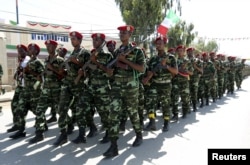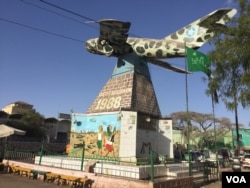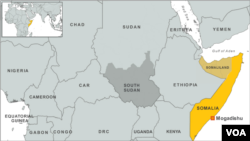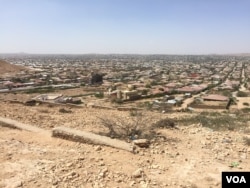People, cattle, camels, donkeys and even a lion dressed up in Somaliland’s red, white and green flag colors for parades and celebrations Wednesday marking 25 years since Somaliland’s self-declared independence from the Federal Republic of Somalia.
Mohamed Ahmed is the executive director of the Somaliland Non State Actors Forum, based in Hargeisa. He, like many other Somalilanders, takes offense to the phrase “self-declared.”
“As you see, many African countries, they become either dictatorships or failed states, like Somalia,” said Ahmed. “But Somaliland is a democratic country like Europe or like America, which you know, [have] a free realm of speech and human rights… so Somaliland is one of the rare countries in the Horn of Africa and the sub-Saharan countries.”
But to the international community, Somaliland is not recognized as a country, even though it has called itself independent since 1991, following a three-year civil war with Somalia. Somalia has refused to recognize that independence but has afforded the region autonomy.
Own government, military
Somaliland has its own government and military and a separate currency. It holds elections and even has a national passport, although travel can often be difficult on an unrecognized country’s documents. And unlike their southern neighbors, Somalilanders enjoy relative security.
For these reasons, Ahmed argues that Somaliland has earned its right to statehood.
“We are very much strong,” said Ahmed. “The international community must accept our case, and I think there is no reason the international community [should] hesitate this time [for] Somaliland not being recognized, because already we have shown that Somaliland has maintained its peace and security, economic development, infrastructure.”
Diplomatic issue
But University of Minnesota professor Abdi Samatar says the international community has reasons for not recognizing Somaliland.
“And if the northern Somalis become Somaliland, and the African Union sanctions that, there is nothing that will stop the African Union from looking into other secessionist groups and saying that they should also go," he said. "So the international community, particularly the United States and the European Union, have been playing second fiddle to the African Union to see where Somaliland or Somalia goes.”
Despite its gains, Somaliland is not perfect, says Samatar. A territorial dispute between Somaliland and Puntland continues over the provinces of Sool, Sanaag and Cayn. Somalilanders suffer from high unemployment rates, and many are still risking the dangerous trip across the Mediterranean to illegally migrate.
Governance crisis
And according to Samatar, there’s yet another problem.
“I mean if you look at what’s going on today,” said Samatar, “there’s a real governance crisis in Hargeisa between different groups who are jostling for power.”
Acknowledging the current security challenges faced in Mogadishu and other parts of Somalia, Samatar argues that Somalis are still better off as one larger block than separate, smaller ones.
“And so, jointly putting their resources together, they will be at a greater advantage to compete with Ethiopia, and Kenya, rather than become different principalities,” Samatar said.
Before 1960, Somalia was divided by colonial powers – the British controlled the northern protectorate of Somaliland, while the Italians were in charge of what is now the Federal Republic of Somalia. In June 1960, Somaliland gained independence from Britain, and five days later, the two former colonies united as the United Republic of Somalia. This arrangement lasted until civil war broke out in 1988.




